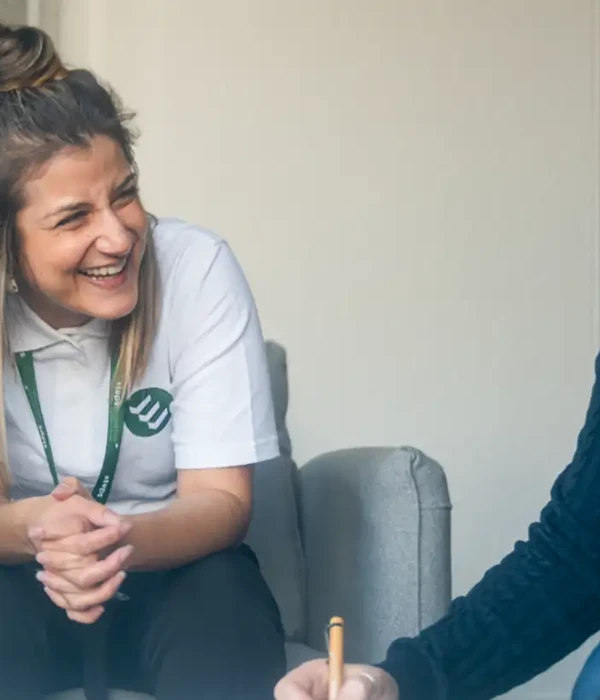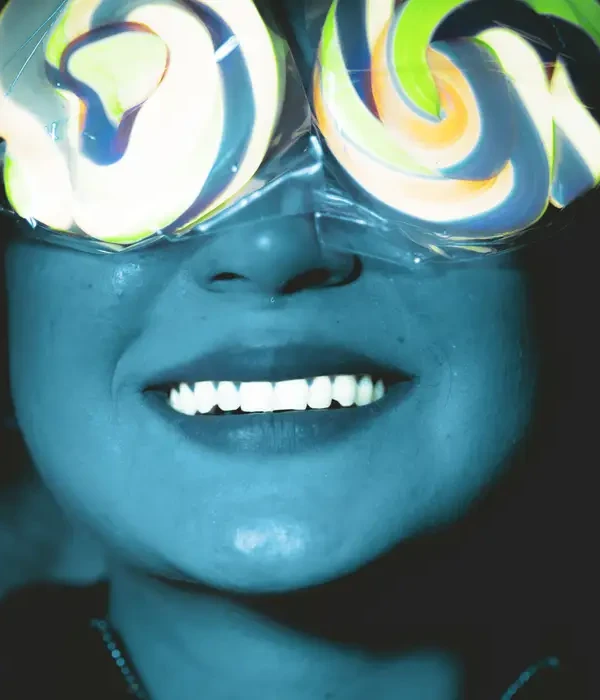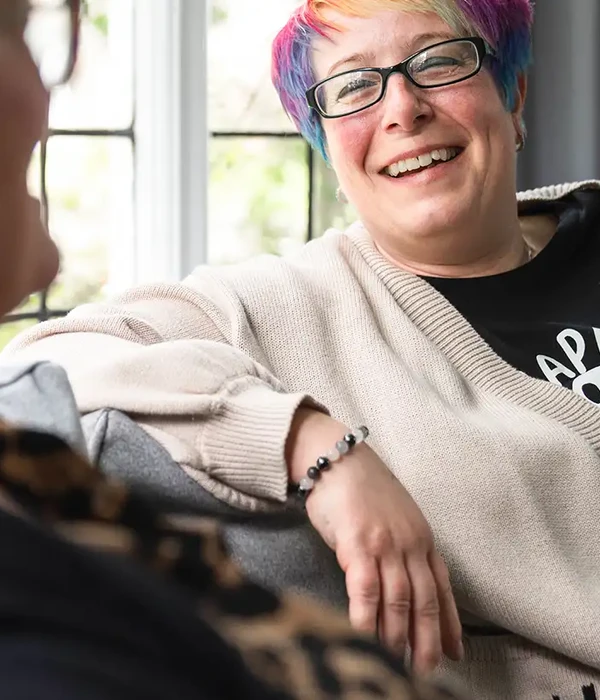Ketamine Addiction Treatment
Ketamine is a drug that has become increasingly prevalent over recent years. Ketamine addiction can affect your health, relationships, and quality of life. Fortunately, there are addiction treatment programmes available for those who need ketamine rehab.
With the right support, you can manage withdrawal symptoms safely and learn healthier ways to cope with stress or emotional pain. Professional ketamine addiction treatment combines therapy, personalised care, and ongoing support to address both the physical and psychological sides of ketamine misuse.

Take the First Step Towards Recovery
Steps Together offers personalised support and proven treatments, providing the care, guidance and encouragement you need to move forward with confidence and build a healthier future.

Understanding Ketamine Addiction
Ketamine, sometimes called Special K, is a dissociative anaesthetic with strong hallucinogenic effects. Ketamine is a powerful medication first used as an anaesthetic in humans and animals. It is classified as a dissociative anaesthetic because it causes you to feel detached from your body and surroundings.
Medical professionals use it to sedate patients during painful procedures because it works quickly and does not slow breathing as much as other sedatives. At lower, non-medical doses, it can cause hallucinations and feelings of unreality.
Ketamine Abuse and Misuse
Abuse occurs when ketamine is taken without medical guidance or in higher-than-prescribed doses. You might be tempted to misuse ketamine for its mind-altering effects, but repeated non-medical use can quickly lead to tolerance and psychological dependence.
Some warning signs of misuse include using ketamine in risky situations, needing higher doses for the same effects, or feeling unable to stop even if you want to. Long-term misuse can cause memory loss, depression, and bladder problems.


Recreational Use and Party Drug Culture
Recreational users often seek out its dissociative and hallucinogenic effects, such as feeling out-of-body or experiencing vivid dreams. The effects usually last about an hour, with after-effects that can linger much longer.
High doses can cause confusion and loss of coordination, which can be frightening and dangerous. Social environments and peer pressure may increase the likelihood that you will experiment with ketamine in a party setting.
Approaches in Ketamine Addiction Treatment
Effective hallucinogen addiction treatment uses a mix of medical support, evidence-based therapies, and personalised care. The success of a treatment plan depends on early assessment, safe detox, and selecting the right approach for your needs. Professional addiction treatment generally involves:
Addiction Assessment and Evaluation
The first step in entering treatment for ketamine addiction is a full addiction assessment. During this evaluation, medical professionals and addiction specialists will discuss your history, patterns of use, physical health, mental health, and personal concerns.
You might have blood tests or urine tests to check your health and substances in your system. The results help your care team choose the most suitable treatment options for ketamine addiction, and whether you need medical detox or an inpatient rehab programme.
Inpatient and Outpatient Treatment Programmes
Inpatient treatment means you stay at a treatment facility, with 24-hour care and daily therapies. This type of ketamine treatment is best if you have strong cravings, mental health needs, or a history of relapse. Inpatient rehab can give you routine, remove distractions, and offer a higher level of support.
Outpatient rehab treatment allows you to attend therapy sessions while living at home. This may be suitable if your ketamine addiction is less severe or if you have work or family commitments. Outpatient programmes through the NHS are free, but treatment can take longer as sessions are spread out across the week.
Ketamine Detoxification
Ketamine detox is the process of clearing the drug from your body under medical supervision. Withdrawal from ketamine can cause symptoms such as anxiety, shaking, sweating, or intense cravings, but it does not usually create strong physical dependence like opioids.
Supervised detox is recommended to manage these symptoms safely. In a supervised setting, medical professionals can offer comfort, monitor your health, and, in some cases, use medications to help relieve withdrawal symptoms and cravings.
Evidence-Based Therapies
Cognitive Behavioural Therapy or CBT helps you to spot and change negative thought patterns linked to drug use. CBT gives practical strategies to avoid relapse and cope with cravings. Other forms of psychotherapy, including one-to-one or group therapy, may also be used.
Dual-diagnosis programmes can treat co-existing mental health disorders alongside addiction. Many clinics tailor therapy to your needs, helping you understand why you use ketamine and build healthy new routines.
Other drug addictions we treat at our rehab centre

Therapeutic Interventions in Ketamine Rehab
Effective ketamine addiction treatment combines personalised care and support to help individuals break free from dependence and build a healthier future. Treatment focuses on managing cravings, building strong coping skills, and improving overall well-being. It also addresses the emotional and psychological challenges that accompany addiction.
Recovery is a long-term process that benefits from consistent aftercare, a stable support system, and positive lifestyle changes. With the right help and commitment, it’s possible to overcome ketamine addiction and regain control of your life.
Individual and Group Therapy
One-to-one therapy allows you to explore your personal story and the reasons behind your ketamine use in a private setting. Therapists use methods like cognitive behavioural therapy to help you spot negative patterns and work on healthier responses. Counselling sessions will focus on teaching you new ways to cope with stress, anxiety, or cravings.
Group therapy puts you in a room with others who are facing similar challenges. This type of therapy helps you realise you’re not alone and can provide motivation to change. Talking in a group can reduce feelings of shame or isolation and let you learn from the experiences of others.

Signs and Symptoms of Ketamine Addiction
Physical effects of ketamine addiction often include trouble with movement, feeling dizzy, and slurred speech. You might also notice frequent bladder problems or pain when passing urine. Some people experience nausea, vomiting, or sweating. Psychologically, ketamine can make you feel disconnected from reality or your surroundings, called dissociation.
Your behaviour can change significantly by taking ketamine. The drive to get and use the drug, even when you know it is harming you, becomes strong. This can lead to risky activities, such as using ketamine alone or in unsafe places. People often start to neglect their responsibilities at school or work.
If you are developing a tolerance, you need more ketamine to achieve the same effects that you once felt with smaller amounts. Psychological dependence means you feel anxious or stressed without ketamine. You may notice intense cravings that are hard to control.
Long-Term Support for Ketamine Use
Drug addiction treatment includes preventing relapse and supporting long-term recovery. This involves developing practical coping habits, maintaining ongoing aftercare, and prioritising your mental health. Long-term support for ketamine addiction includes:
Developing Coping Skills
Learning new ways to deal with stress is vital for staying in ketamine recovery. You might need to identify triggers that lead to drug use, such as certain places, people, or emotions. Writing them down can help you identify patterns and plan your responses.
You should practise healthy behaviours like deep breathing, mindfulness, or going for a walk instead of turning to ketamine when you feel stressed. Support from friends, family, or support groups can also make a real difference. Many people find it helpful to talk with a counsellor to learn problem-solving and manage urges.
Maintaining Mental Health and Wellness
Caring for your mental health is closely linked to your success in addiction recovery. You may find it helpful to keep a regular sleep schedule, eat balanced meals, and exercise most days. These habits can boost your mood and help you think clearly.
It is normal to have periods of low mood or anxiety after ketamine use, but ongoing support and talking to mental health professionals can help. Practising relaxation techniques or hobbies gives you healthy ways to cope with negative emotions. Getting enough rest and connecting with others supports your recovery.
Aftercare Programmes
Aftercare programmes provide structure and support as you start to rebuild your life without ketamine. Many people attend regular therapy sessions, group meetings, or workshops focused on relapse prevention. These sessions keep you connected to others who understand your challenges.
Useful aftercare services may include one-to-one counselling, addiction support groups, family therapy, or online resources. Sticking with an aftercare plan helps you stay focused and motivated, especially during difficult times. It also reduces the risk of sudden relapse by offering ongoing support.

Treatment for Ketamine Addiction is Available
Drug addiction is a serious health condition that can impact every part of your life, including your physical health, mental well-being, relationships, and sense of purpose. Ketamine addiction can be difficult to manage alone, but recovery is possible with the right support.
At Steps Together, our ketamine addiction treatment options are designed to help you or a loved one break free from dependence and start building a healthier, more fulfilling life. Reaching out is the first step. It only takes a phone call or email to begin your path to recovery today.
Frequently Asked Questions
What are the recognised therapeutic approaches for treating ketamine dependency?
Treatment often starts with a medically supervised detox, which helps your body adjust without the drug. Many programmes use psychotherapy, such as cognitive behavioural therapy, to address unhealthy behaviours and thinking patterns.
Can one undergo ketamine addiction treatment on an outpatient basis?
Outpatient treatment is possible, especially for individuals who have a strong support network and a stable home life. This approach allows you to receive therapy and support while continuing with daily activities.
What support strategies are recommended post-rehabilitation to prevent relapse into ketamine use?
Ongoing therapy, regular check-ins with your healthcare provider, and participation in support groups are effective strategies for managing chronic pain. Many find strength in peer support and structured aftercare plans.
How long does an effective rehabilitation programme for ketamine abuse typically last?
Most rehabilitation programmes range from 30 to 90 days. Some people might need a longer stay if their addiction is more severe or if they have other health issues. Your progress, commitment, and personal needs will also affect the length of your treatment.
What are the potential risks of untreated ketamine addiction?
Untreated ketamine addiction can lead to bladder and kidney damage, memory loss, and long-term problems with thinking and concentration. You may also develop severe psychological issues, such as anxiety or depression.
Are there any medications approved for managing ketamine withdrawal symptoms?
Currently, there are no medications specifically approved for treating ketamine withdrawal. However, certain medicines may be prescribed to help manage symptoms such as anxiety, agitation, or sleep problems during withdrawal.





